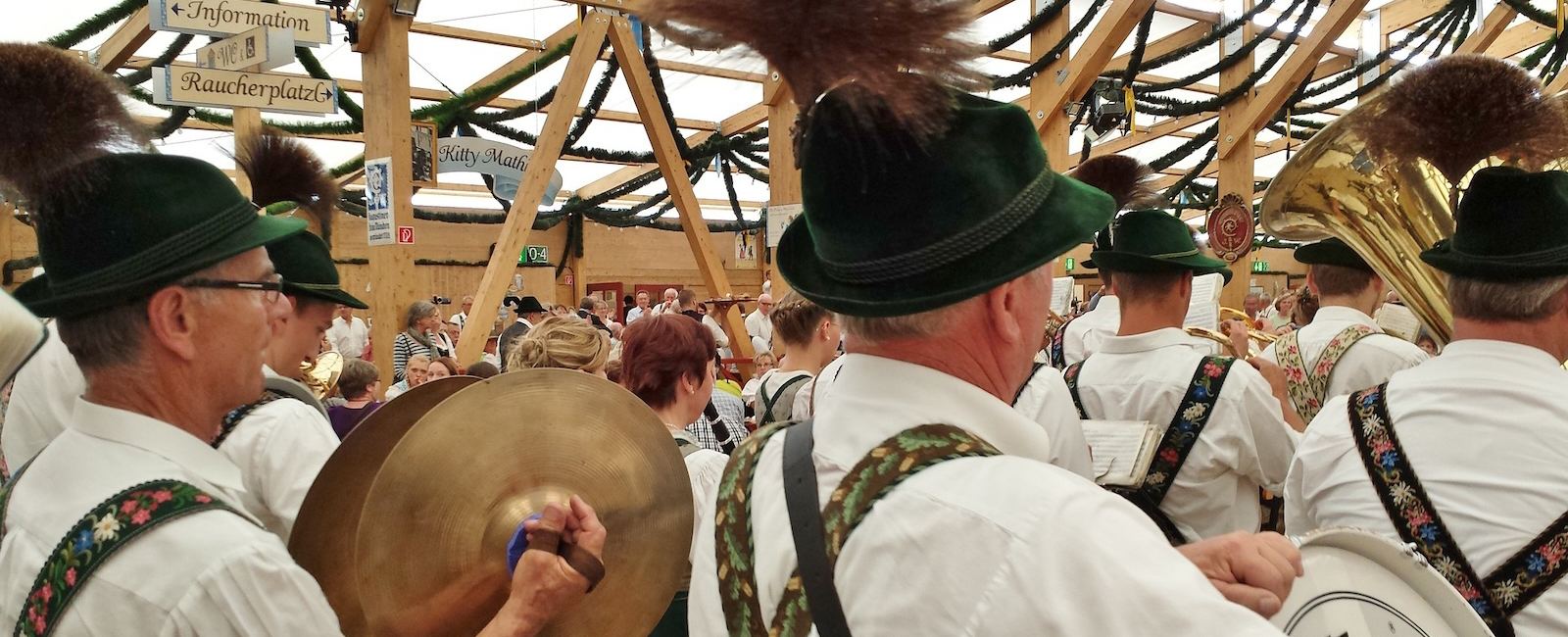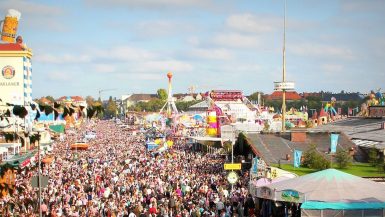Bavaria is renowned for its picturesque landscapes, charming villages, and, most notably, its vibrant and rich cultural traditions. From the world-famous Oktoberfest to the enchanting Nuremberg Christmas Market and the lively Fasching celebrations, Bavaria offers a cultural calendar filled with festivities that reflect the region’s history, traditions, and joie de vivre. In this article, we’ll explore these major Bavarian festivals and events, diving into their histories, significance, and what you can expect when you visit.
Oktoberfest: The World’s Largest Beer Festival
History and Significance
Oktoberfest, held annually in Munich, is perhaps the most famous of all Bavarian festivals. It originated in 1810 to celebrate the marriage of Crown Prince Ludwig (later King Ludwig I) to Princess Therese of Saxe-Hildburghausen. The citizens of Munich were invited to join in the festivities, which included horse races, music, and dancing. The celebration was so successful that it became an annual event, evolving into the colossal festival it is today.
What to Expect
Oktoberfest typically runs from late September to the first weekend in October, attracting millions of visitors from around the world. The festival grounds, known as the Theresienwiese, are transformed into a bustling wonderland of massive beer tents, each operated by one of Munich’s historic breweries. Visitors can enjoy traditional Bavarian music, indulge in hearty local cuisine like pretzels, sausages, and roast chicken, and, of course, savor a wide variety of Bavarian beers.
Apart from the beer tents, Oktoberfest also features a funfair with thrilling rides, games, and attractions for all ages. Traditional costumes, such as lederhosen for men and dirndls for women, add to the festive atmosphere, making Oktoberfest a truly immersive cultural experience.
Nuremberg Christmas Market: A Winter Wonderland
History and Significance
The Nuremberg Christmas Market, or Christkindlesmarkt, is one of the oldest and most famous Christmas markets in the world, dating back to the early 17th century. Held in the heart of Nuremberg’s Old Town, the market’s roots lie in medieval traditions where locals would gather to celebrate the Advent season.
What to Expect
The Nuremberg Christmas Market is a magical winter wonderland, typically held from the end of November to Christmas Eve. The market is renowned for its beautiful wooden stalls, adorned with festive decorations and twinkling lights. Visitors can browse a wide array of handmade crafts, ornaments, and gifts, perfect for holiday shopping.
One of the highlights of the Christkindlesmarkt is the food. The market is famous for its Nuremberg Lebkuchen (gingerbread), Glühwein (mulled wine), and Rostbratwurst (grilled sausages). These delicious treats, along with the cheerful sounds of carolers and the scent of fresh pine, create a warm and inviting atmosphere that embodies the spirit of Christmas.
The Christkind
A unique feature of the Nuremberg Christmas Market is the Christkind, a young woman chosen to represent the Christmas Angel. She wears a golden crown and white robe, and her role includes opening the market with a prologue and visiting local hospitals and nursing homes, spreading joy and holiday cheer.
Fasching: Bavaria’s Carnival Season
History and Significance
Fasching, also known as Karneval or Fastnacht in other parts of Germany, is the pre-Lenten carnival season celebrated with great enthusiasm across Bavaria. Its origins can be traced back to ancient pagan rituals, which were later incorporated into Christian traditions. Fasching is a time of revelry and excess before the fasting period of Lent begins on Ash Wednesday.
What to Expect
Fasching typically starts on Epiphany (January 6) and culminates in a flurry of festivities in the week leading up to Ash Wednesday. The highlight of Fasching is Rosenmontag (Rose Monday), when towns and cities across Bavaria host parades, parties, and various events.
During Fasching, you’ll see colorful costumes, elaborate masks, and lively street performances. Parades feature floats, marching bands, and dancers, creating a carnival atmosphere that invites everyone to join in the fun. Traditional Fasching foods include Krapfen (doughnuts filled with jam), often enjoyed with a glass of Schnapps.
Notable Fasching Celebrations
- Munich Fasching: Munich hosts one of Bavaria’s largest Fasching celebrations, with street parties, parades, and the famous Viktualienmarkt dance of the market women.
- Nuremberg Fasching: Known for its vibrant parades and family-friendly events, Nuremberg’s Fasching celebrations are a great way to experience the festive spirit.
- Franconian Fasching: The Franconian region of Bavaria has its own unique Fasching traditions, with many towns hosting traditional dances, masked balls, and humorous performances known as “Sitzungen.”
Bayreuth Festival: A Celebration of Wagnerian Opera
History and Significance
The Bayreuth Festival, or Bayreuther Festspiele, is an annual festival held in the town of Bayreuth, dedicated to the performance of operas by the 19th-century German composer Richard Wagner. Founded in 1876 by Wagner himself, the festival has become a pilgrimage site for opera enthusiasts worldwide, showcasing the composer’s epic works in the theater he designed specifically for their performance, the Bayreuth Festspielhaus.
What to Expect
The festival runs for several weeks during the summer, typically from late July to August. Each year, the program includes performances of Wagner’s major operas, such as “The Ring of the Nibelung” (Der Ring des Nibelungen), “Tristan und Isolde,” and “Parsifal.” The unique acoustics and design of the Festspielhaus provide an unparalleled auditory experience, making the performances truly exceptional.
Tickets to the Bayreuth Festival are highly sought after and can be challenging to obtain, often requiring advance planning and participation in a lottery system. However, for Wagner aficionados and classical music lovers, attending the Bayreuth Festival is a once-in-a-lifetime experience.
Landshut Wedding: A Journey Back in Time
History and Significance
The Landshut Wedding (Landshuter Hochzeit) is a historical pageant held every four years in the town of Landshut. It commemorates the wedding of Duke George of Bavaria to Polish Princess Hedwig Jagiellon in 1475, an event celebrated with grandeur and festivity in the Middle Ages. The modern re-enactment, initiated in the early 20th century, aims to preserve and celebrate this historical moment.
What to Expect
The Landshut Wedding is a three-week-long festival typically held in July, drawing participants and spectators from around the world. The event features over 2,000 costumed performers who recreate the medieval wedding procession, complete with knights, courtiers, musicians, and craftsmen. The city is transformed into a medieval wonderland with elaborate decorations, jousting tournaments, theatrical performances, and traditional crafts.
Visitors can immerse themselves in the historical atmosphere by attending the various events, feasting on medieval-inspired cuisine, and enjoying the lively music and dances. The Landshut Wedding is a captivating experience that offers a glimpse into Bavaria’s rich history and cultural heritage.
Starkbierfest: The Strong Beer Festival
History and Significance
Starkbierfest, or the Strong Beer Festival, is a lesser-known but equally cherished Bavarian festival held in Munich. Originating in the 17th century with Paulaner monks, who brewed strong beer to sustain themselves during Lent, Starkbierfest has become a beloved tradition. The beer, known as Starkbier or “liquid bread,” has a higher alcohol content and a rich, malty flavor.
What to Expect
Starkbierfest takes place during Lent, typically from late February to mid-March, offering a more intimate and less crowded alternative to Oktoberfest. The festival is celebrated in various beer halls and breweries across Munich, such as the Paulaner am Nockherberg and Löwenbräukeller.
Visitors can enjoy hearty Bavarian dishes, traditional music, and the star of the festival: the strong beer. The atmosphere is convivial and lively, with locals and visitors alike coming together to toast with steins of Starkbier. It’s a fantastic opportunity to experience Bavarian beer culture in a more relaxed and authentic setting.
Conclusion
Bavaria’s cultural calendar is a testament to the region’s rich history and vibrant traditions. Whether you’re raising a stein at Oktoberfest, wandering through the enchanting stalls of the Nuremberg Christmas Market, joining the colorful parades of Fasching, experiencing the grandeur of the Bayreuth Festival, stepping back in time at the Landshut Wedding, or savoring the robust flavors of Starkbierfest, each festival offers a unique and unforgettable experience. These celebrations provide a glimpse into the heart of Bavarian culture, showcasing the warmth, hospitality, and joyous spirit of its people. So, mark your calendar, don your lederhosen or dirndl, and get ready to immerse yourself in the festive charm of Bavaria. Prost!

